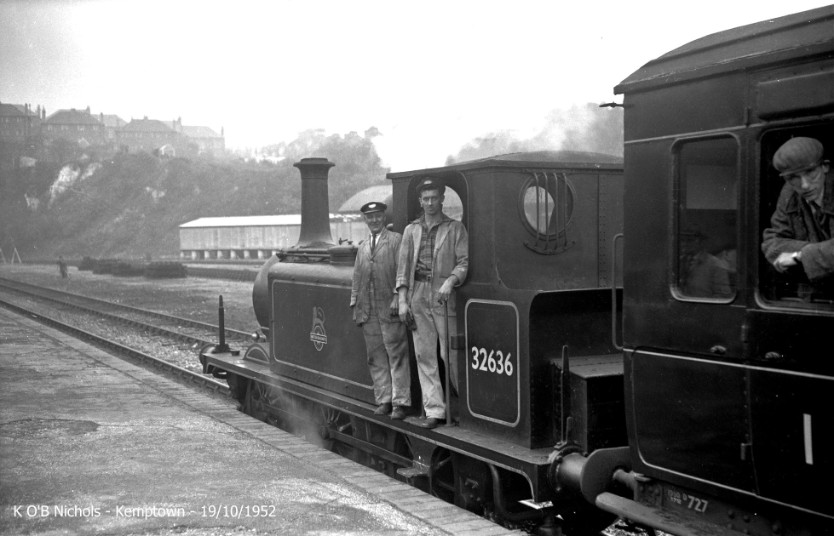
Bill Sherwin
Newhaven A.S.L.E.F. Branch Secretary 1952 - 1954
Extracted and adapted from
Newhaven Branch Meeting
Sunday June 8th 1952
Bros. A. Newbegin (A.S.L.E.F. Organiser),
This meeting was held for the purpose of electing Branch Officers and re-constituting the Branch after a period of 5 years without Branch and was called by Organiser Bro. A. Newbegin for this purpose.
The chair was taken at 11.15 a.m. by Bro. W. Sherwin.
Minutes of last meeting of April 20th 1947 was read and as there was no questions asked concerning them it was proposed by Bro. J. Hillman and seconded by Bro. J. Lower. Minutes of the previous meeting be accepted as read.
Secretary then called attention to main business of this meeting which was the election of a panel of Branch Officers. At this stage Bro. A. Newbegin asked to say a few words.
Bro. A. Newbegin, called attention to this un-constitutional state which happened when there were no Branch Officers and called attention to the fact that Secretary had been carrying on alone more or less for many of 15 ½ years of service to the branch and invited all members present to try to arouse some interest in the Branch and assist the new officers in their appointment. Bro. Newbegin pointed out the fact that such apathy in branch meetings caused the members to lose touch with Head Office and so become out of touch with the Executive’s endeavours on our behalf as regards our Conditions of Service etc. He also pointed out that this loss of contact with membership was serious should it be necessary to close a Branch and rely on a Contributions Collector attached to another Branch. In this respect Bro. Newbegin was pleased to see a number of young members and called for all young members to take an interest in the affairs of their Branch.
The election of Branch Officers was then proceeded with and as Secretary was discussed of resignation from that position it was proposed by Bro. J. Hillman and seconded by Bro. J. Lower, Bro. E. King be Chairman of this Branch. Carried
Proposed by Bro. J. Hillman and seconded by Bro. R. Turner, to be Vice Chairman was (no nomination) to which all members present agreed Carried.
On an introduction by retiring Secretary, it was proposed by Bro. J. Hillman and seconded by J. Nash. That Bro. W. Sherwin be Branch Secretary. Carried.
Volunteered, Bro. R. Hooker to be Assistant Secretary was seconded by Bro. J. Hillman, to which all members present agreed.
The Branch Committee was formed of those members who being present and not in office other wise as follows.
Bros R. Turner, J. Lower, J. Nash, E. Hillman, M. Freeman, D. Brady & R. Crouch.
Proposed by Bro. E. King and seconded by Bro. J. Lower. Bro. E. Lucknott be Branch Stewart and collector as he had offered to collect for Bro. E. King previously. Carrie.
Proposed by Bro. J. Hillman and seconded by Bro. C. lower. That Bo. E. King be No.4 District Council delegate as he was still willing to attend.
Bro. A. Newbegin the addressed the Branch, on the Society’s Policy as mentioned on member circulars letters and outlined the Executive Committee’s claim now put forward with the other two Railway Unions for an increase of 10% on wages also a cleaner and definite system of Payment of increase for Saturday afternoon working. Further he pointed out that the principle already evolved by the Society was without the support of the N.U.R. and T.S.S.A. and pointed out also that although cost of living was continually rising any increase offered would not be easily got, in view of the fact that we now had a Tory government and Mr. R.A. Butler was trying to coerce the T.U.C. to agree to a wage freeze.
Railway trade unions would have a stiff task to achieve any increase in wages or alterations in Conditions of Service, which would make necessary the attention of every member of the unions concerned.
Bro Newbegin then announced that the Railway Executives reply to the wages claim made would be published on June 28th and it might or might not include an offer of some sort much depended on the policy of Mr. Butler.
Bro. Newbegin then went on to speak about the society’s endeavours to formulate a pension scheme on the point that the salaried Staff have a superannuation fund of General application, but not the outdoor staffs and claim that what was as good for Clerks is equally good for other grades be further pointed out that whereas the National Coal Board had now produced a pension scheme for the miners with a lump sum of £2,000 000 and even so the miner’s pension was not very big, but it was a pension. While the Railway Executive was formulating a pension fund financial structure it was apparently designed to be a voluntary nature, but the E.C. of the union considered any such scheme should be compulsory to ensure stability and satisfaction and in this way the pension could be higher.
At this year’s A.A.D. a resolution had been put forward for a Pension scheme to be formulated this year by the end of the year if no satisfaction is obtained a conference be called early in the New Year to consider matter further.
Some aspects and items of the Machinery of Negotiations had been amended, but the majority of the amendments would be accepted and some further negotiated. Nominations and elections of L.D.C. would come under this clause. Different arrangements were pending with regards to discipline cases, such as Form 1 charge sheets, more time than the 48 hours being allowed for a charged man to gather his evidence for an appeal and to interview or call witnesses. It has also been forward that the official of the Railway, hearing such as appeal, should not be the person who decided the request punishment; even should he not have signed the punishment order.
Bro. Newbegin further dealt with items being negotiated as to the holding of L.D.C. meetings, it being attempted to get L.D.C. meetings always held in on duty time, where this was not possible member who attend in their own off duty time should be paid for part of day or all day at ordinary rate for the time involved. Where L.D.C. member were asked to attend on Rest Days either a suitable day be given in lieu or payment made for 10hrs for such meeting.
The address was terminated by a short survey of matters being discussed or decisions reached of matters domestic to the Southern Region. Points also touched upon were the proposal for a standard eyesight test and its bearing on new entrants into the service.
As no questions were asked, a vote of thanks be accorded to Bro. Newbegin for his help, to which all members concurred.
The address was terminated by a short survey of matters being discussion reached of matters domestic to the Southern Region, points also reached upon were proposal for a standard eyesight test and its bearing on new entrants into the service. s no question were asked, Bro. Sherwin proposed and Bro. J. Lower seconded. 'A vote of thanks be recorded to Bro. Newbegin for his help to which all members concurred.
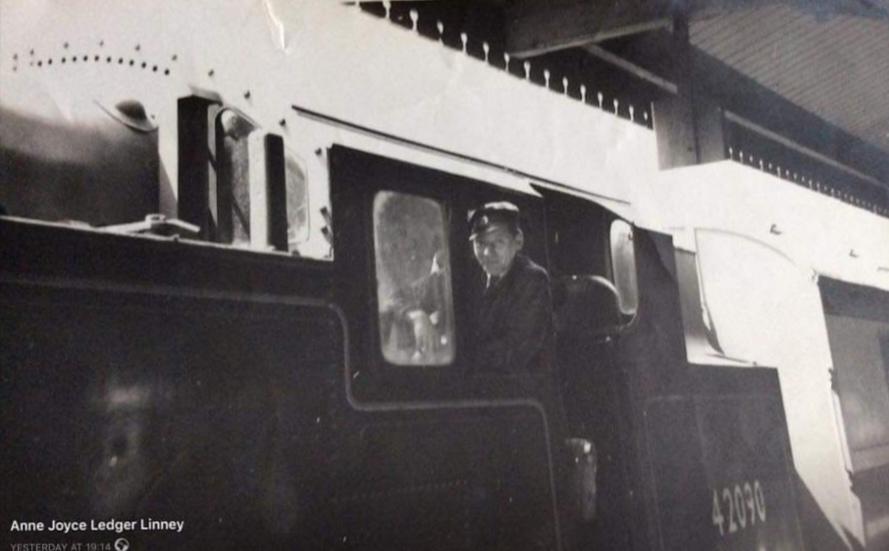
7070
BRITISH TRANSPORT COMMISSIONBRITISH RAILWAYS-----------------------------------------
EXAMINATION OF ENGINE CLEANERS AND FIREMEN TO ACT AS FIREMEN AND DRIVERS RESPECTIVELY
1. Training of Engine Cleaners in the duties of a Cleaner.A Cleaner will be given practical instruction in the correct method of cleaning locomotives and the use of the various cleaning materials and tools.
2. Training of Engine Cleaners in the duties of a Fireman.A Cleaner prior to being passed to act, when required, as a Fireman will be given preliminary tuition lasting two weeks by a Firing Instructor. This training will include instruction:-(a) Parts and functions of locomotives.(b) Lighting, making up, cleaning and disposing of fires.(c) Working of injectors and function of fusible plugs.(d) Rules and regulations.(e) Prevention of accidents.(f) Coupling and uncoupling and general duties and responsibilities of a Fireman.
3. Passing of Engine Cleaners to act as Firemen.In normal circumstance, no cleaner will be allowed to act as Fireman on a locomotive until has attained the age of 18 years, although there are certain temporary exceptions.When an Engine Cleaner required for firing duties has been satisfactory reported on by the Firing Instructor, he will be given an oral examination in the following subjects:-(a) General description of a locomotive, i.e. names of component parts, etc.(b) General knowledge of rules and regulations, particularly applicable to -Hand and fixed signalling.Protection of trains and opposite lines.Locomotive equipment.(c) Method of firing a locomotive and general duties and responsibilities of a Fireman.An Engine Cleaner who fails, at the first attempt, to pass this examination to act as Fireman will be allowed two further attempts at stipulated intervals.An Engine Cleaner qualified to act as a Fireman will be re-designated Passed Cleaner.
4. Promotion of Engine Cleaners or Passed Cleaners to Firemen.Vacancies for Firemen will be filled in accordance with the provision of the promotion arrangements agreed with the Trade Unions.
5. Passing of Firemen to act as Drivers.No man is eligible to act as a Driver until he has been appointed Firemen, has attained 23 years of age and has performed 574 firing turns of duty.When a Fireman is required for driving duties he will undergo a technical examination which will comprise an oral and practical examination.
(a) Oral Examination.The candidate will be examined in the following subjects:-(i) Knowledge of locomotive.(ii) Knowledge of mechanism of continuous brakes.(iii) Method of dealing with locomotive defects(iv) Knowledge of the various types of signals, their use and the rules relating to the reading of signals.(vi) Knowledge of the making out of reports.
(b) Practical ExaminationThis examination will be carried out on the footplate of locomotive in traffic.Particular attention will be paid to the following points:-(i) Care and manipulation of locomotive (ii) Attention to boiler and fire(iii) Attention to signals and judging distances(iv) Attention to rules and regulations(v) Knowledge of locomotive parts.(vi) Making and using trimmings(vii) Care in and attention to oiling(viii) Examining locomotive and reporting defects.(ix) General knowledge of automatic and steam brakes.(x) Ability of examinee to change a boiler water gauge glass.The practical examination is not to carried out on the same day as that on which the oral examination is held.A fireman who fails to pass the technical examination to act as Driver at the first attempt will be allowed two further attempts at stipulated intervals.A Fireman qualified to act as Driver will be re-designated Passed Fireman.
6. Promotion of Firemen or Passed Firemen to Drivers.Vacancies for Drivers will be filled in accordance with the provisions of the promotion arrangements agreed with Trade Unions.
7. Physical and Visual Examinations by Medical Officers.Before being passed to act in a higher grade or on promotion to a higher grade employees are required, under the arrangements currently in force, to pass the physical and visual examination by the Medical Officer.
Date of document unknown
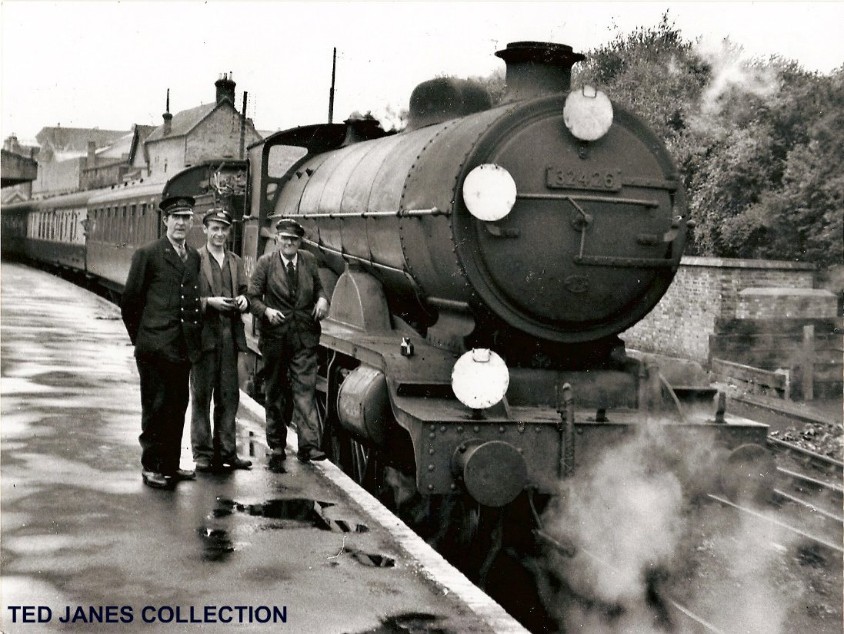
Driver Bob Roser, Fireman Ted Janes & Unknown Brighton Guard
This photo was taken by Fred Rich at Bournemouth West
on the 15th August 1952, with 13:52
Bournemouth West to Brighton
The engine was a Brighton Atlantic Class H2, 32426 'St. Albans Head'
Ted Janes recalls firing to Arthur Robert Roser for about two years in
the 'Top Gang' and he was possibly
Ted's longest mate and was apleasure to fire to.
Bob at the time of this photo being taken would of been about 59 years old and Ted was 24.
Bob Roser entered the footplate grades at Brighton on the 25.06.1910.
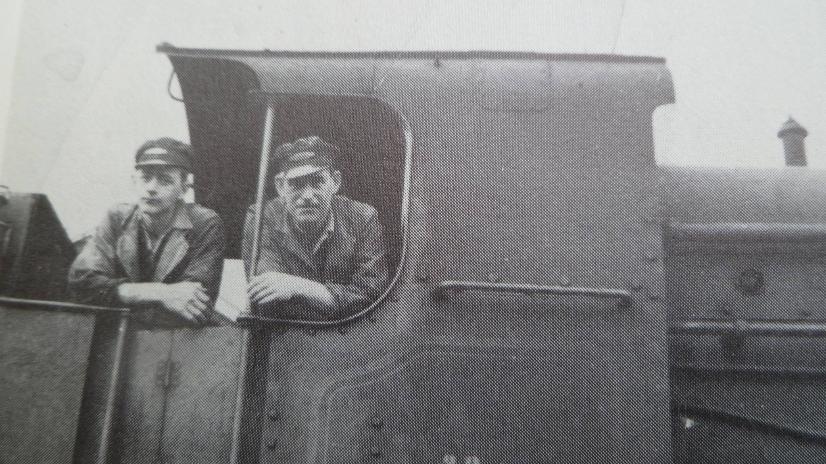
GEORGE HOLLANDS COLLECTION
Left - Right: T.W.W Fireman George Hollands & Unknown Driver
at Brighton Top Yard Turntable
Brighton Locomotive Works
Centenary Special train runs
To commemorate the centenary of "Brighton Locomotive Works, two Brighton Works Centenary Specials train run, on the 5th & 19th October 1952, when the "Railway Correspondence & Travel Society (R.C.T.S.), for the first time offered its members all-Pullman travel on fast schedules.
Both trains were hauled by H2 Atlantics, the first special on the 5th was hauled No.32424 "Beachy Head" , and worked by Newhaven locomen Driver Sydney Turner & Fireman Fred Stratton. On the 19th October, No. 32435 "Trevose Head" with Brighton locomen.
On the 5th October 1952, the special train of eight Pullman carriages left Victoria for Brighton, headed by the forty one year old Atlantic Class No.32424, Beachy Head. With exception of the locomotive's livery of British Railways it replicated the authentic of the old Southern Belle. The journey down was done in 58.2minutes and the returning in 60 minutes, in spite of signal checks on both journeys.
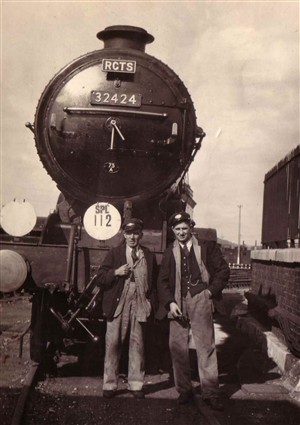
G.F. Bloxam/Sylvia Woolford Collection
Left ~ Right: Newhaven Driver Sydney Turner & Fireman Fred Stratton standing in front of Atlantic Class H2 'Beachy Head' on "the Centenary of Brighton Locomotive Works”
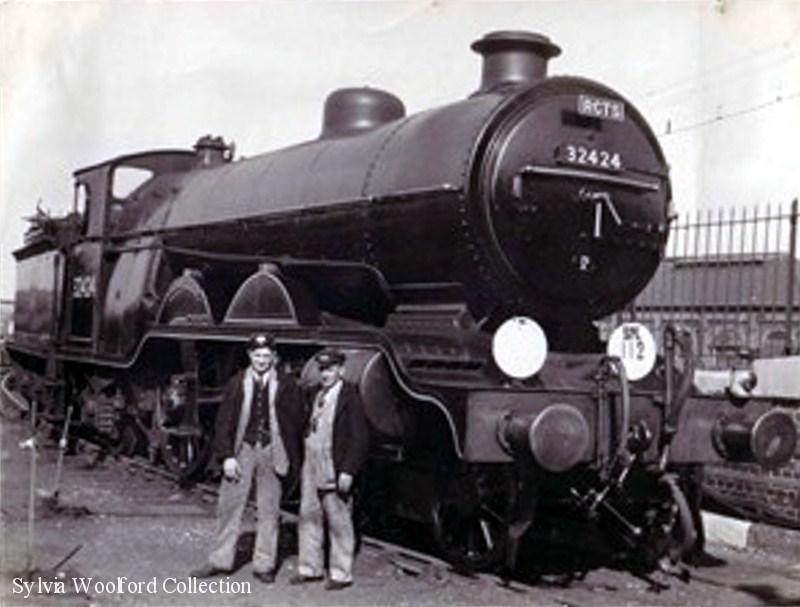
Left ~ Right: Newhaven Fireman Fred Stratton & Driver Sydney Turner at Brighton Works
Sydney Turner was born in Deal in Kent (1896), he started off as an Engine Cleaner in 1914, later promoted to Fireman and eventually became an Engine Driver at Folkestone He moved to Newhaven in 1936 and was promoted to driving the main-line Boat Trains to Victoria, Sydney died in 1962.
Extracted from
'Our Newhaven' web sited
Sylvia Woolford Grand-daughter of Sydney Turne
STORIES FROM THE SHOVEL
Brighton Driver George Laycock
By Ted Janes
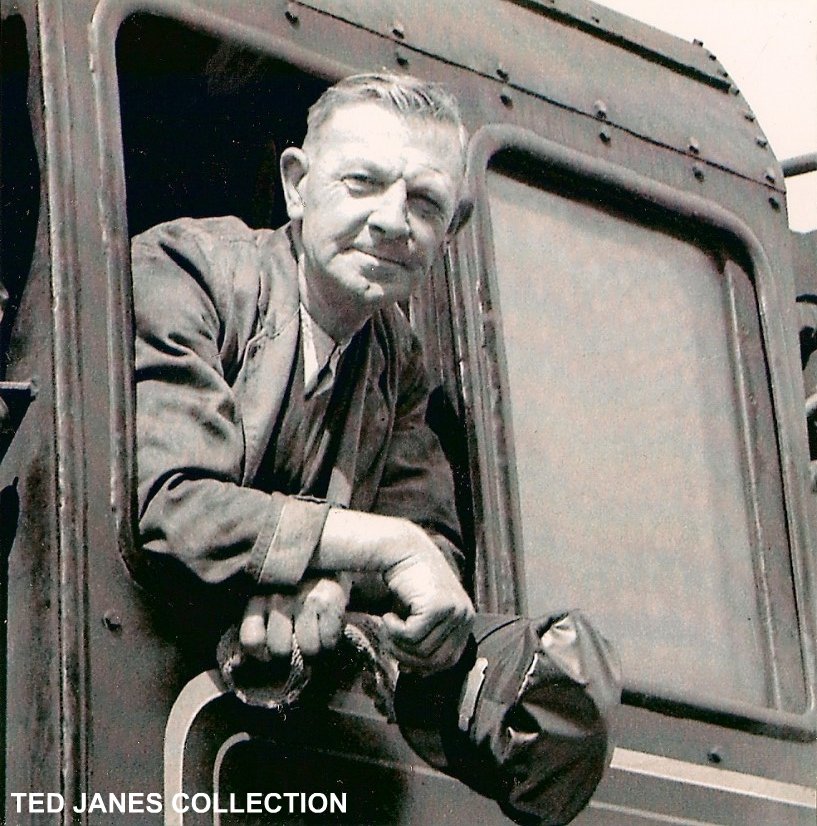
PHOTO BY FRED RICH
Driver George Frederick Laycock on a West Country 34045 "Ottery St. Mary" on the 4th July 1952George was approach his 62nd birthday which was on the 23rd July. George entered the footplate grades on the 11.06.1909.

PHOTO BY FRED RICH
Driver George Frederick Laycock on a West Country 34045 "Ottery St. Mary" on the 4th July 1952George was approach his 62nd birthday which was on the 23rd July. George entered the footplate grades on the 11.06.1909.
George Laycock was one of my favourite drivers out of the 11 regular mates during his firing career. I fired to George in 1949-1950 in the next to top link, without doubt the happiest two years of my firing career. He had the nickname of John Bull and a couple of his previous mates didn't get on too well with him but we got on well together and would frequently have a drink and game of snooker even though we had done a days work together I can recall, that all my drivers were very nice blokes and it was a pleasure to be at work with them all. However George really stands out from the rest.
I fired to George in the "Second Gang" which at time was mostly made up of work which the "Top Gang" did not want, so the "Second Gang" had a variety of work which included a trip up the "Cuckoo" from Polegate to the Wells along with the 03:25 paper train.
He had a wicked side and Tunbridge Wells was his happy hunting ground for winding people up, more often than not about their short shunts to London and what they were missing by not having West Country's to work on.
George or Gerry as he was often known, was the tops!
Railway Correspondence & Travel Society
to commemorate the centenary of the Brighton Loco Works
